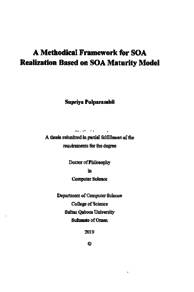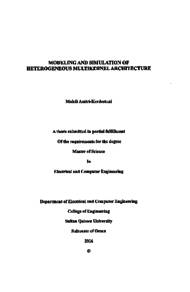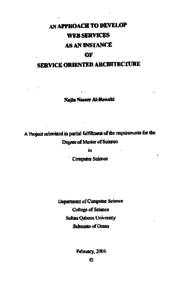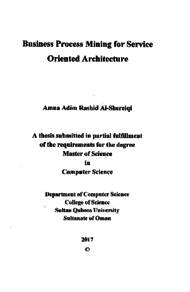Document
A methodical framework fof SOA realization based on SOA maturity model
Publisher
Sultan Qaboos University
Gregorian
2019
Language
English
English abstract
The rapidly changing business requirements expect high business process flexibility. These requirements necessitate a swift composition of applications, which is no longer supported by the monolithic architecture. Therefore, service oriented architecture (SOA) is introduced for enhanced business control. As an architectural style, SOA improves the efficiency of developing information systems and also enables a rapid response to everchanging business needs. Currently, the enterprises are not only adopting SOA but also using SOA maturity models (SOAMMs) to guide them to reach desirable maturity levels. SOA adoption is a complex process, with different levels of maturity that require knowhow in terms of practices. This research aims to develop a methodical framework for SOA realization based on the SOA maturity model. The framework concerns with capturing knowledge on how to identify and shape the main building blocks for methodology dimension at different SOA adoption maturity levels. We follow the design science research methodology for information system development to develop the framework. More precisely, a systematic mapping study of existing SOAMMs is conducted to guide the selection of a maturity model. Welke's model is extended to serve as a base to structure the proposed framework. The extended model defines methodical building blocks, methodical guidelines, and SOA capabilities for different maturity levels. Two algorithms are specified and implemented for the metric definition to predict SOA capabilities. This research applies the basic principles of method engineering to define method fragments for different maturity levels. Eclipse Process Framework Composer models and stores the method fragments for further reuse. The proposed framework is evaluated using various evaluation techniques. The framework provides methodical knowledge and components that fit with the methodology dimension of Welke's SOAMM. Logically the framework has two views, (i) the capability view offers the structural properties that influence the SOA capabilities, and the quantitative metrics for structural properties, (ii) the method view includes the method fragments to realize the building blocks. The framework is supported by tools for maturity assessment, metrics definition, and method base. The applicability of the proposed framework is evaluated using a case study. The evaluation results revealed that the framework would help enterprises to select method fragments required at each maturity level and ultimately to accomplish business excellence. The proposed framework outperforms the existing frameworks in methodical knowledge coverage and tool support. The implications of this research are twofold: from a theoretical perspective, the researchers or practitioners can use the results to engineer new methods. From a practical standpoint, enterprises can use the extended Welke's SOAMM to assess their current maturity level and select the required method fragments from the method base provided in the proposed framework for further implementation.
Member of
Resource URL
Arabic abstract
تحتاج متطلبات العمل المتغيرة بسرعة مرونة عالية في عملية الأعمال. تتطلب هذه المتطلبات تركيبة سريعة من التطبيقات، والتي لم تعد مدعومة من قبل العمارة المتجانسة. لذلك، ظهرت البنية الخدمية (SOA) لتحسين التحكم في الأعمال. باعتبارها أسلوبا معماريا، تعمل البنية الخدمية على تحسين كفاءة تطوير أنظمة المعلومات كما انها توفر استجابة سريعة لاحتياجات العمل المتغيرة باستمرار. في الوقت الحالي، لا تقوم المؤسسات فقط باعتماد البنية الخدمية ولكن أيضا تقوم باستخدام نماذج نضج البنية الخدمية (SOAMMs) لتوجيهها للوصول إلى مستويات النضج المرغوبة. إن اعتماد البنية الخدمية عملية معقدة، حيث توجد مستويات مختلفة من النضج تتطلب خبرة من حيث الممارسات. يهدف هذا البحث إلى تطوير إطار عمل منهجي لتحقيق البنية الخدمية على أساس نماذج نضج البنية الخدمية. تم تصميم إطار العمل لهندسة طرق جديدة، حيث أن لبنات البناء الرئيسية هي خدمات مختلفة الأنواع تستخدم في بعد المنهجية، والذي يجب تضمينه عند تطوير أي نموذج نضج. يهتم الإطار بتزويد المعرفة الكافية حول كيفية تحديد وتشكيل اللبنات الأساسية عند مستويات نضج مختلفة للبنية الخدمية. تم تطبيق منهجية تصميم البحث العلمي التطوير نظام المعلومات من أجل تطوير الإطار. بتعبير أدق، تم إجراء دراسة تخطيطية منتظمة عن نماذج نضج البنية الخدمية لتحديد توجيهاتهم المنهجية لتحقيق البنية الخدمية. علاوة على ذلك، تم إجراء دراسة لتحديد الفجوات الموجودة في أطر هندسة الطرق (ME) الحالية لتوجيه الخدمة. تم توسيع نموذج Welke ليكون بمثابة قاعدة لهيكلة الإطار المقترح. تتضمن المعرفة المنهجية لمستويات النضج المختلفة ما يلي: (1) اللبنات المنهجية، (2) المبادئ التوجيهية المنهجية، و (3) اجزاء الطرق. يطبق هذا البحث المبادئ الأساسية لهندسة الطرق من اجل تحديد أجزاء الطرق. تقوم قاعدة الطرق بتخزين المعرفة المنهجية من اجل إعادة استخدامها. تم تقييم الإطار المقترح باستخدام طرق تقييم مختلفة. يوفر الإطار أجزاء ومكونات الطرق التي تتناسب مع بعد المنهجية في نموذج welke. يوفر الاطار رؤيتين كما يلي: (1) توفر رؤية القدرة الخصائص الهيكلية التي تؤثر على قدرات البنية الخدمية، والمقاييس الكمية للخصائص الهيكلية، (2) تشمل رؤية الطريقة اجزاء الطرق لتحقيق اللبنات الأساسية. تم دعم الإطار بأدوات لتحديد المقاييس وتقييم النضج وقاعدة الطرق. تم تقييم قابلية تطبيق الإطار المقترح باستخدام دراسة حالة. كشفت نتائج التقييم أن الإطار يساعد المؤسسات على اختيار اجزاء الطرق المطلوبة عند كل مستوى نضج من اجل تحقيق التفوق في الأعمال. يتفوق الإطار المقترح على الأطر الحالية في تغطية المعرفة المنهجية وتوفير أداة دعم. الآثار المترتبة على هذا البحث ذات شقين: من منظور نظري، يمكن للباحثين أو الممارسين استخدام النتائج في تصميم طرق جديدة من الناحية العملية، تستطيع المؤسسات استخدام نموذج Welke الموسع لتقييم مستوى نضجهم الحالي واختيار أجزاء الطرق المطلوبة من قاعدة الطرق المتوفرة في الإطار المقترح من أجل تنفيذها لاحقا.
Category
Theses and Dissertations




